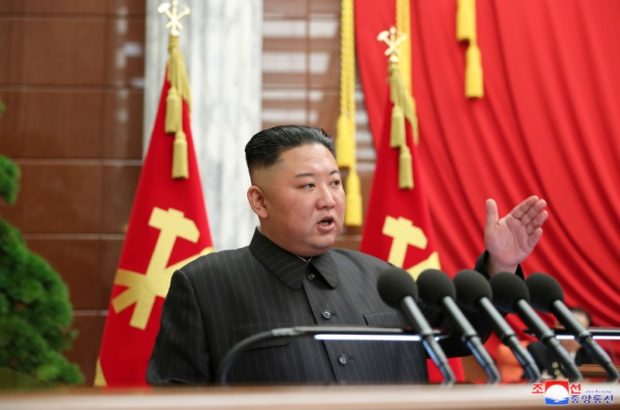
North Korean leader Kim Jong Un speaks during a Report on Enlarged Meeting of the 2nd Political Bureau of the 8th Central Committee of the Workers’ Party of Korea, in Pyongyang, North Korea in this image released July 5, 2021 by the country’s Korean Central News Agency. KCNA via REUTERS
SEOUL — The presidential office is monitoring North Korea for a further reaction to the South Korea-US military exercises as the four-day preliminary drills took off Tuesday, a senior Cheong Wa Dae official said in response to Pyongyang’s accusation earlier in the day that the drills threatened peace.
Previously the Defense and Unification ministries had communicated with their North Korean counterparts by phone twice a day, but North Korea did not respond to a call from the South on Tuesday afternoon.
“We will not jump to any conclusions and will monitor North Korea’s response,” the official said, not giving a direct answer when asked whether President Moon Jae-in and North Korean leader Kim Jong-un had exchanged any more letters.
The two leaders had exchanged letters since April, the presidential office said earlier, describing the exchange as pivotal to reconnecting the inter-Korean hotlines two weeks ago. The North has since demanded the South suspend drills to accelerate a thaw in the strained inter-Korean relations.
“The drills, which epitomize America’s hostile policy toward us, are an unwelcome, self-destructive action that threatens stability on the Korean Peninsula,” Kim Yo-jong said, adding that Seoul and Washington would have to deal with a greater security threat if they brushed off her warning.
Kim Yo-jong, deputy director of Pyongyang’s propaganda affairs, called Washington hypocritical, describing its outreach to engage the regime unconditionally as a trick to mask its intention to invade the regime.
She called for the removal of US troops and US-made weapons from the South, referring to the F-35 stealth jets and the anti-missile battery known as Terminal High Altitude Area Defense. They hamper peace efforts, she said, adding that the North would bolster its defense readiness and its capabilities for a preemptive strike.
“She’s basically laying out justification for Pyongyang’s weapon tests. Tests could be imminent,” said Kim Dong-yub, a professor at the University of North Korean studies in Seoul.
But Park Won-gon, a professor of North Korean Studies at Ewha Womans University, said it was too early to look for signs of provocation. The North, which is under UN and US sanctions, has made it clear that sanctions relief has to take place for any engagement to resume, Park noted.
“We needn’t overreact every time the regime rolls out something disheartening because that’s North Korea,” said Cheong Seong-chang, director of the Center for North Korean Studies at the Sejong Institute.
North Korea is used to weaponizing tension to get its way and South Korea should carry on with its policy rather than make adjustments along the way, Cheong said.
A Ministry of National Defense spokesperson declined to comment on Kim Yo-jong’s statement, saying the drills are a joint decision between the South and the US. A senior official at the Ministry of Unification, which handles inter-Korean affairs, said the ministry would monitor the North’s response.
The drills, mainly held in spring and summer to bolster the allies’ defense readiness, are computer-based war games rather than all-out field exercises. They have been suspended since 2019, when former US President Donald Trump halted them to save costs and facilitate North Korea’s denuclearization.
Seoul and Washington are expected to follow through with this year’s exercises, though they are likely to scale them down in a new practice adopted at last year’s August drills amid concerns over COVID-19.
The reduced drills have prevented the South Korean government from taking over wartime operational control from the US, which has exercised it since the 1950-53 Korean War. Since it ended with an armistice and not a peace treaty, the two Koreas are technically still at war.
Seoul is not expected to complete the handover under President Moon, who promised to wrap it up before leaving office in May next year. The Defense Ministry neither confirms nor denies that the transfer can take place as planned.